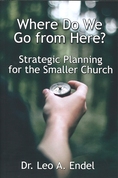|
In the past two weeks, I have talked about change in the life of the local church. I pointed out the reality that pastors have to be better leaders than do leaders in other segments of life, and that the number one person a pastor must lead well is himself. This week I want us to remember that as we lead change in the church, we need to make sure it is the right change, at the right time, and it is done in the right way. This week I want to talk about the challenges we face in making the right changes.
There are several things that make it hard to know what the right changes are. One is the reality that there are no two churches exactly alike! A church is a living organism-organization that is made up of unique people. There was a time in our nation’s history when being a Great Commission Baptist Church (GCB) could be clearly and uniformly described. Those days are long gone. Although we share a common theology, the churches in our own small part of GCB life that we call the Heartland Church Network are very diverse: we have large and small churches; new and old churches; urban, inner-city, small town, and rural churches; churches that worship in English, Spanish, Arabic (Neur and Bari), Zomi, Karen, Creole, Chinese, Korean, Russian / Ukrainian, and Nepalese; churches that are predominantly Africa-American and Native-American. Although principles transcend time and culture, the application of those principles can look very different from one culture to another. There was a time in GCB life that when a church found something that worked really, really well in their church, their pastor was hired by our Sunday School Board. He wrote a book or guidelines on how to do what he did in his church. Pastors and church leaders were trained on how to do that specific program. They ran the program. And if it was done well, it usually worked. Those days are long gone. This means that not only does a pastor have to be a better change agent, he also has to be a better strategic thinker. But this has to start with a strong prayer life. One that is hyper-sensitive to what is happening in the life of his church members (where is God leading them) and his community (what are the opportunities and needs). If that isn’t enough to frustrate you, let me point out that we live in a constant state of information overload. In simpler days, our problem was finding enough information to make an informed decision. Today we have to filter through the volumes of information that are available at our fingertips as we google the world’s answers. Everything you read is not relevant to your context. We even have to wade through disinformation as we sort out what is true as well as what is relevant. Not everything we read on the internet is true—no matter how fancy the web site! When I am searching, I will also find a lot of what I will call uninformed information. The number of bloggers is almost unlimited. Some of them know what they are talking about, but some are just suffering from undelivered speech. I also find non-critical thinkers telling you why their church is growing. These will be people who are in the midst of the forest and can’t see the forest for the trees; however, they are willing and they think they are able to tell you “all about the forest.” I will briefly mention a third complicating factor: the rate and level of change that is occurring in our culture. What might have been the right change in January 2020 suddenly became the wrong change in March. We had to be willing to pivot on a dime as we moved quickly into unchartered territory. No one had a map! Well, that’s not actually true. God has the map. Which brings me back to your prayer life. "For I know the thoughts that I think toward you, says the Lord, thoughts of peace and not of evil, to give you a future and a hope. Then you will call upon Me and go and pray to Me, and I will listen to you. And you will seek Me and find Me, when you search for Me with all your heart." –Jeremiah 29:11-13 Bottom line: I strongly encourage every pastor to lead his church in times of focused prayer, seeking God’s leadership as we navigate uncharted waters. Having done that, I would encourage you to invite an experienced outside consultant, like your Associational Mission Strategist, to work with your leadership team to facilitate some simple, but revealing, strategic exercises. Then, with some options in hand, you can prayerfully and carefully begin to identify the right time and the right way—which we will look at in the next two weeks.
1 Comment
Last week I wrote on the reality that pastors have to be better leaders than leaders in other segments of society. Today I want to point out that effective leaders, no matter where they are called to lead, must first learn to lead themselves or they will never lead others at a high level.
One major area where pastors and other Christian leaders “should” have a significant advantage in is self-leadership. On a daily basis, God’s Spirit seeks to speak truth to our spirit. Unfortunately, pastors are no different than any other professing believer, because there are times when our actions or our failures to act will grieve or quench the Holy Spirit (Ephesians 4:30 and I Thessalonians 5:19). However; when we are being filled by the Spirit (Ephesians 5:18), we become broken vessels that God can and does use in powerful ways. I will not labor the point by preaching to the preachers on this topic; however, I will say that unless we are in a truly accountable relationship with other pastors, we will become easily self-deceived. Let me use one of my Wyoming cowboy analogies at this point. Satan’s number one tool for making a pastor an ineffective leader is to cut him out of the herd. Once he has you trying to do your job on your own, the clock is ticking. It’s only a matter of time before a self-isolated pastor’s ministry will falter. Our culture is full of fallen and disgraced pastors who thought they could do it on their own. Another reality of self-leadership is that it takes time and prioritization. While I am busy trying to lead others, I can easily lose sight of the need to lead myself. We have to be able to hear our inner voice, and that of God’s Spirit, whispering to us over the cacophony and the cries of the world around us. Those of us who have a special portion of compassion (shepherds) are drawn to care for the hurting hoards that surround us. Those of us who are driven by the gift of evangelism are focused on the lost and dying in our midst. Those of us who are gifted in leadership will always be striving to make those around us better leaders. Those of us who are uniquely gifted in administration (overseers) will always be tweaking our organizational processes and the people who staff them so they can function more effectively. It is absolutely Biblical that we serve as God has uniquely gifted each of us (I Timothy 4:14). But, we must always be serving out of the overflow, mindful of the admonition in Psalm 46:10 to “be still, and know that I am God.” Lead yourself to frequent times of refreshment with Him. Speaking of time, we all know that trusted leaders are more effective leaders and unfortunately it takes time to build trust. The fact is that there are churches whose history requires a LOT OF TIME before a pastor can develop trust. I had a conversation yesterday with a church leader whose church is currently looking for a new pastor following the painful resignation of its last pastor. Our visit basically revolved around a lack of trust that exists between members and their current lay-leadership team. Knowing the church’s history, my only counsel was to be patient and prayerful because it will take time for trust to be reestablished. But it takes both time AND effective leadership. You cannot expect people to follow if you are not leading yourself well. Do you follow-through on what you say you will do? Scheduling a meeting and then not showing up communicates disrespect for others. Are you punctual with your appointments? Showing up late tells others that their time doesn’t matter. Do you do your homework before meetings and do you have a printed agenda for them? Stumbling and stammering your way through a meeting is a quick way to destroy leadership credibility. Trust can be destroyed in a minute. Bottom line! To effectively lead others we have to be a better leader of oneself. To lead ourselves better we must yield every minute to God’s leadership through His indwelling Holy Spirit. Yours in Christ, Mark R. Elliott, DoM  When change is needed, a pastor has to be a better leader than leaders in most other segments of our culture for two reasons. In other sectors, a leader can, at the minimum, get people to accept the change because if they don’t the paychecks stop coming. On the other hand, a pastor is expected to motivate, equip, and deploy volunteers who can choose to walk away when they don’t like the change. Secondly, we live in a rapidly changing world in which COVID has forced even more changes. Everyone’s tolerance for change has been tested! What also makes leading change in the church harder is that most committed believers view their church as a haven of rest, a place of stability and security from a world rocked by chaos and change. So when changes are needed, and in today’s world every church has had to make significant changes, a pastor has to be able to clearly define current reality, communicate why change is needed, know how to identify what the right changes are, and be able to lead the adoption and implementation of those changes. From my experience, and I have had it confirmed by others who serve churches in a similar capacity, the majority of pastors use their gifts of shepherding, teaching, and preaching more than they do their gift of leadership. That reality shouldn’t surprise us when we stop and remember the majority of churches are single staff or bi-vocational, and the day-to-day pastoral care required is extremely fluid. Most churches end up reacting to the changes that are forced upon them rather than being proactive to identify needed change and implement it well. Because of the changes that engulf us, the need for thoughtful and prayerful leadership is greater today than it has been in decades. The early church had to navigate significant change. Acts 1:15-26 records a simple four-step process describing how the church replaced Judas as an apostle. First, they established specific criteria (21-22). Second, they identified their top two candidates (23). Third, they had a time of focused prayer (24-25). Finally, they used a culturally accepted selection process (26). We see a similar process used in Acts 6:1-7 when the church made major changes to their ministry to widows. First, they defined their new reality—the church was growing, there were unmet needs, and the current leadership structure was not adequate (1-2). Then they defined the criteria for the new ministry role and clarified the ongoing role of the apostles (3-4). They received consensus from the church (5a). Fourth, they identified men who met the criteria (5b-6a). They had a season of prayer to seek God’s face (6b). Finally, there was a formal recognition of those selected through the laying on of hands (6c). Processes are available, but how can a pastor and church in a chaotic and busy 2020 world find time to define reality, identify what needs to change, brainstorm options, determine the best choices, and implement the needed change? Well, I’m delighted to share with you a resource I encountered a few weeks ago. It is the book Where Do We Go from Here? Strategic Planning for the Smaller Church by Dr. Leo A. Endel. I even used it Saturday with one of our language churches. Dr. Endel is a long-time friend, and the book lays out a simple process that with minimal coaching any pastor could use to lead a one-day strategy training event. Heartland Church Network has purchased several copies, and if you are interested, I would love to get you a copy. I am also willing to coach you as you use it in your church. Give me a call, send me a text, or drop me an e-mail and I will get you a copy. After you’ve read it, give me a call, and we can talk through the process. Take time to lead in a prayerful and proactive manner without having to use a painfully long and often unproductive process. Yours in Christ, Mark R. Elliott, DoM Listening to the radio on my commute this morning, the on-air personalities discussed a survey on current causes of anxiety. They concluded that our inability to control what is going on around us was THE source of human anxiety. As I look at my own life and visit with pastors and church leaders, I sense a lot of anxiety as we are living in turbulent and unprecedented times. Things are “not normal” and from day-to-day we must make decisions based on new circumstances and new information—things seem to be spinning out of control.
If their assumption about the source of anxiety is true, and I think it hits the heart of human anxiety, then the key question is, “What do we actually control in our world?” For most of us, if we were really honest, it is a very short list. As human beings, we struggle to even control our own passions, let alone have the power to control what’s happening in someone else’s life or the events occurring around us. So the critical question really is, “How can I find the power to move my own heart from anxiety to peace?” As professing Christians, our first question is what does the Bible tells us about anxiety? Most of us are familiar with the Sermon on the Mount (Matthew 6:25-34). In it Jesus tells us to “seek first the kingdom of God and His righteousness.” In other words, we are empowered when God is THE priority in our daily life. The question then becomes, “What does our calendar and check book tell us about how high God is on our priority list?” The lower He is on our priority list the HIGHER our anxiety in life will be. Paul’s words in Philippians 4:6-7 are often quoted in times of stress. “Be anxious for nothing, but in everything by prayer and supplication, with thanksgiving, let your requests be made known to God; and the peace of God, which surpasses all understanding, will guard your hearts and minds through Christ Jesus.” Many Christians can quote these verses, but how often do the words alone bring peace? Paul is suggesting that we are empowered when prayer is a regularly practiced spiritual discipline in our life. The Bible teaches us that rote memorized prayers and meaningless recitation of Bible verses is not what God is seeking in our prayer life. “The Lord is near to those who have a broken heart, and saves such as have a contrite spirit.” (Psalm 34:18) In the upper room the night before Jesus went to the cross, He told His disciples “These things I have spoken to you, that in Me you may have peace. In the world you will have tribulation; but be of good cheer, I have overcome the world.” (John 16:33) Jesus mentions two variables for finding peace. One is that we admit tribulations are a normal part of life. The other is that God is the source of peace, because He has overcome the chaos of the world. Before making this statement to His disciples, Jesus had repeated multiple times two specific themes: as we are going, God will empower us with the Holy Spirit (John 14:15-18 & 2-28, 15:26-27; 16:5-15) and God answers our prayers (John 14:13, 15:7 & 16, 16:23). So, we are empowered by the Holy Spirit that dwells within us and we are empowered by the knowledge that God hears and answers our prayers. Anxiety resides within us when we are listening to the spirit of our fleshly nature, and are denying the power of prayer. Now comes the moment of honesty and confession. Even knowing all this to be true, there are still moments, and some times days and weeks, when anxiety resides in our hearts. In those “moments,” we need to humble ourselves like the father of the epileptic son did when he cried out “Lord, I believe, help my unbelief!” (Mark 9:24) We also need to lean on one another and seek the encouragement and/or exhortation of a brother or sister in Christ who can help us through those difficult moments. James tells us to confess our trespasses to one another, and to pray for one another, because the effectual fervent prayer of a righteous friend will avail much (5:16). We are empowered by the prayers of our friends when we confess our faults and failures. We can’t control much in life, but we can choose to do the things that can truly empower us. |
AuthorRetired in April 2022, Mark R. Elliott served as a Director of Missions (Associational Mission Strategist) in Western Iowa and Eastern Nebraska for almost three decades. He is a strong advocate for obedience and Biblically based disciple making. As such, he knows that making healthy disciples requires Christian leaders to be constantly pursuing spiritual maturity—be lifelong learners. Because of the time constraints of ministry, most pastors focus their reading list on resources that assist them in teaching and preaching the Word of God. As such, books focusing on church health, leadership development, and church growth tend to find their way to the bottom of the stack. With that reality in mind, Mark has written discussion summaries on several books that have helped him to personally grow in Christ and that tend to find themselves on the bottom of most pastor’s stack. Many pastors have found them helpful as they are able to more quickly process great insights from other pastors and authors. Archives
April 2022
Categories |
Looking for something? |
© COPYRIGHT 2024. ALL RIGHTS RESERVED.
|







 RSS Feed
RSS Feed
